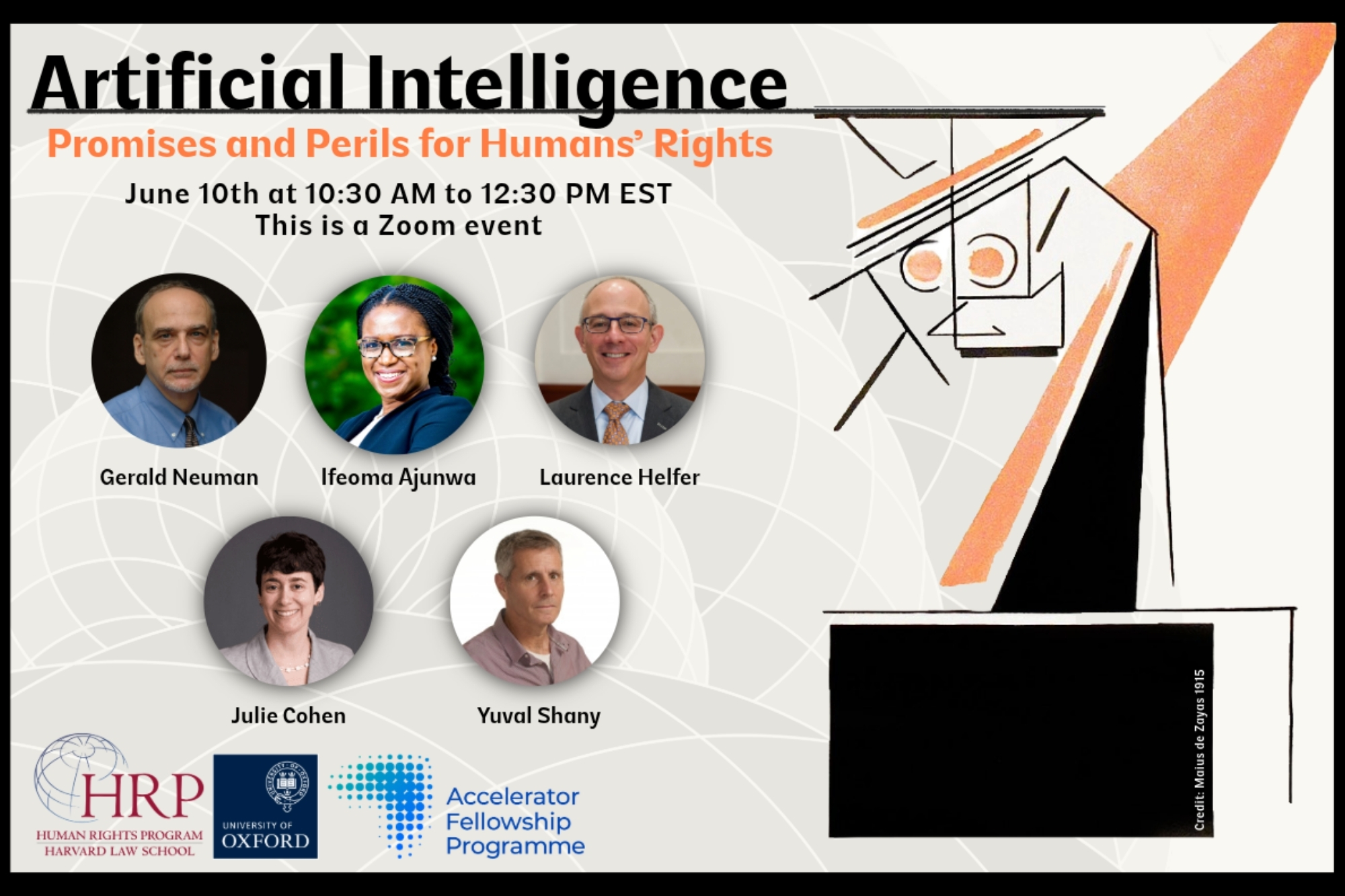Artificial Intelligence—Promises and Perils for Humans’ Rights

Hosted by the Accelerator Fellowship Programme (AFP) of the University of Oxford and the Human Rights Program of Harvard Law School
- Location: Online event via Zoom
- Date: 10 June 2025
- Time: 15:30PM - 17:00PM BST (10:30 AM - 12:00 PM EST)
- Registration: Zoom form here
In recent years, rapid advances in Artificial Intelligence (AI) technology, significantly accelerated by the development and deployment of deep learning and Large Language Models, have taken center stage in policy discussions and public consciousness. Amidst a public both intrigued and apprehensive about AI’s transformative potential across workplaces, families, and even broader political, economic, and geopolitical structures, a crucial conversation is emerging around its ethical, legal, and policy dimensions.
This webinar will convene a panel of prominent experts from diverse fields to delve into the critical implications of AI for humans and their rights. The discussion will broadly address the anticipated human rights harms stemming from AI’s increasing integration into society and explore potential responses to these challenges. A key focus will be on the role of international law and human rights law in addressing these harms, considering whether this legal framework can offer the appropriate tools for effective intervention.
Panelists
Ifeoma Ajunwa is Asa Griggs Candler Professor of Law at Emory Law School where she is also the Associate Dean for Projects and Partnerships and the Founding Director of the A.I. and Future of Work Program. Dr. Ajunwa is author of the book, The Quantified Worker, published by Cambridge University Press, and the co-author of The Oxford Handbook on Algorithmic Governance. Her recent essay for the Yale Law Journal, “A.I. and Captured Capital,” examines the human rights implications for A.I. development and deployment. A prolific expert on A.I. governance, an international keynote speaker, and a board member on A.I. ethics advisory boards, Dr. Ajunwa is a graduate of Columbia University and Yale Law School.
Julie E. Cohen is the Mark Claster Mamolen Professor of Law and Technology and a faculty co-director of the Institute for Technology Law and Policy at the Georgetown University Law Center. She teaches and writes about surveillance, privacy and data protection, intellectual property, information platforms, and the ways that networked information and communication technologies are reshaping legal institutions. She is the author of Between Truth and Power: The Legal Constructions of Informational Capitalism (Oxford University Press, 2019); Configuring the Networked Self: Law, Code and the Play of Everyday Practice (Yale University Press, 2012), which won the 2013 Association of Internet Researchers Book Award and was shortlisted for the Surveillance & Society Journal’s 2013 Book Prize; and numerous journal articles and book chapters.
Laurence R. Helfer is the Harry R. Chadwick, Sr. Professor of Law and co-director of the Center for International and Comparative Law at Duke University, and a Permanent Visiting Professor at iCourts: Center of Excellence for International Courts at the University of Copenhagen. Helfer has authored more than 100 scholarly publications and lectured widely on his diverse research interests, which include international human rights law and institutions, treaty design, and international adjudication. He and Veronika Fikfak recently published Automating International Human Rights Adjudication, 46 Mich. J. Int’l Law 69 (2025). Helfer was nominated by the United States and elected as a member of the UN Human Rights Committee (2023-2026).
Gerald L. Neuman, PhD MIT 1977, is the J. Sinclair Armstrong Professor of International, Foreign, and Comparative Law at Harvard Law School, and Director of its Human Rights Program. He served on the (UN) Human Rights Committee from 2011-2014. He participated in the 2023 workshop of the Institute for Ethics in AI on the human right to a human decision, and has written for the resulting conference volume, forthcoming from Oxford University Press.
Yuval Shany is the Hersch Lauterpacht Chair in International Law and former Dean of the Law Faculty of the Hebrew University of Jerusalem. He also serves as a Senior Research Fellow at the Israel Democracy Institute, and a Visiting Professor in the Center for Transnational Legal Studies (CTLS) at King’s College, London and the Graduate Institute of International Studies in Geneva. He was a member of the UN Human Rights Committee between 2013-2020 (chairing the Committee between 2018-2019). His current research focuses on international human rights law and new technology and he leads a European Research Council group or researchers investigating the three generation of digital human rights (3GDR). Shany is an honorary fellow of the Senior Common Room at Magdalen College (2023-2024) and an inaugural Accelerator Fellow at the Ethics in AI Institute in Oxford.
This event is co-sponsored by Harvard Law School’s Human Rights Program and the University of Oxford’s Accelerator Fellowship Programme.


